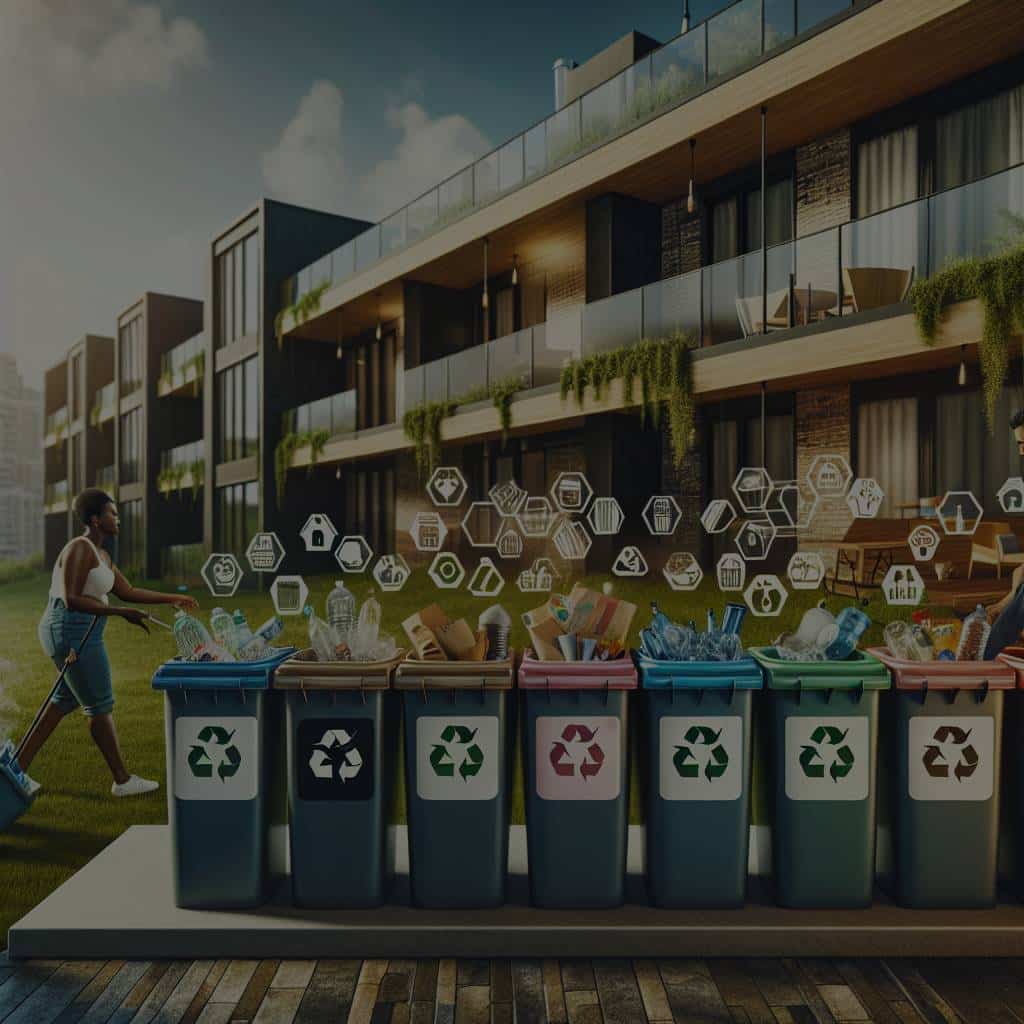What Are the Best Practices for Sustainable Waste Management in Large Real Estate Complexes?

Managing waste in a sustainable manner is no longer an option, but a necessity in our rapidly changing world. This is particularly true for large real estate complexes, where waste management can be a significant challenge due to the volume of waste generated. The global push towards sustainability, coupled with stringent environmental regulations, necessitates innovative and efficient waste management strategies. This article will focus on the best practices for sustainable waste management in large real estate complexes.
Incorporating Waste Management in Building Design
Design plays a crucial role in waste management. By incorporating waste management considerations into the initial design phase of a real estate complex, you can significantly reduce the amount of waste generated and improve the ease of recycling efforts.
A voir aussi : What Is the Potential of Micro-Units for Solving Urban Housing Shortages in the UK?
Firstly, consider the materials you use in construction. Opt for materials that have a low environmental impact, are durable, and can be easily reused or recycled. This could include materials like reclaimed wood, recycled metal, or green concrete. By choosing such materials, you can not only reduce the waste generated during construction but also ensure that any waste produced can be recycled more effortlessly.
Furthermore, design the property to facilitate recycling efforts. For example, provide dedicated spaces for waste sorting and recycling bins in each unit and throughout the complex. This encourages residents to separate their waste and makes it easier for waste to be collected and recycled.
A voir aussi : What Are the Impacts of High-Speed Rail Developments on Real Estate Values in Adjacent Areas?
Green Energy for Waste Management
Utilizing green energy in waste management processes can significantly improve sustainability. Energy recovery from waste is a powerful tool for reducing the environmental impact of waste while also offering a renewable source of energy.
One commonly used method is the anaerobic digestion of organic waste. This process involves the breakdown of organic material by bacteria in the absence of oxygen, producing biogas. This biogas can then be used as a source of renewable energy, powering buildings within the real estate complex or being sold back to the grid.
Another method is the incineration of waste to produce heat and electricity. While incineration can lead to the release of harmful emissions, modern technology allows for the capture and treatment of these emissions, reducing their impact on the environment.
Reducing Waste on Site
Reducing waste generation at the source is one of the most effective ways of managing waste. This can be achieved by promoting waste reduction practices among the residents of the real estate complex.
Educate the residents about the importance of waste reduction and provide them with tips on how to reduce their waste. This could include strategies such as composting organic waste, purchasing items with less packaging, or opting for reusable items instead of single-use ones.
Additionally, implement policies that promote waste reduction. For instance, you can provide incentives for residents who produce less waste or penalize those who do not sort their waste correctly.
Commercial Recycling
Commercial recycling plays an integral part in sustainable waste management. By segregating waste and ensuring that recyclable materials are properly disposed of, you can significantly reduce the amount of waste sent to landfills.
Firstly, have a clear waste segregation system in place. Provide separate bins for different types of waste and ensure that these are conveniently located throughout the real estate complex. Additionally, educate residents about the importance of waste segregation and how to properly dispose of various types of waste.
Secondly, tie up with reliable recycling companies. These companies can collect and process recyclable waste, ensuring that it is properly recycled and does not end up in landfills.
Sustainable Waste Management and Environmental Impact
Sustainable waste management has a profound impact on the environment. It not only reduces the amount of waste sent to landfills but also minimizes the extraction of natural resources, reduces energy consumption, and decreases greenhouse gas emissions.
By implementing sustainable waste management practices, you can significantly improve the environmental performance of your real estate complex. This not only helps to safeguard the environment but also enhances the value of the property and its attractiveness to potential tenants and buyers.
Remember, sustainable waste management is not just about managing waste. It is about creating a system that reduces waste generation, recycles what is produced, and reuses what can be salvaged. It is about building a future where waste is not just a problem to be solved, but a valuable resource to be harnessed.
Construction and Demolition Waste Management
Proper management of construction and demolition (C&D) waste is a major component of sustainable waste management in real estate complexes. Building and demolishing structures inevitably generates a considerable amount of waste. However, with careful planning, much of this waste can be reused or recycled, thus minimizing its negative environmental impact.
C&D waste includes a wide array of materials such as concrete, wood, metals, glass, and plastics. Each of these materials can potentially be recycled or repurposed in various ways. For example, concrete and metals can be recycled into new construction materials, while wood can be repurposed for furniture or other uses.
Using a portfolio manager to track and manage the generation and disposal of C&D waste can lead to more efficient and eco-friendly practices. A portfolio manager can help real estate complexes identify opportunities for waste reduction, set realistic waste management goals, and monitor progress towards these goals.
It’s also beneficial to work with waste disposal companies that specialize in C&D waste. Such companies have the equipment and expertise needed to properly sort, recycle, and dispose of C&D materials. They can also provide valuable guidance on how to minimize waste during construction and demolition processes.
Long-Term Property Management and Waste Reduction
In the long-term, property management plays a vital role in sustainable waste management. Property managers can implement various strategies to promote waste reduction and recycling among residents of real estate complexes.
One effective strategy is implementing a waste reduction management program. This program can educate residents about the importance of reducing, reusing, and recycling waste. It can also provide practical tips and tricks for residents to reduce their waste footprint, such as composting organic waste or using reusable shopping bags.
Moreover, property managers can make it easier for residents to recycle by providing conveniently located recycling bins throughout the complex. They can also organize regular waste audits to identify opportunities for improvement and track progress towards waste reduction goals.
Property management can also encourage commercial businesses within real estate complexes to adopt sustainable waste practices. For instance, they can introduce policies that encourage businesses to reduce packaging or use eco-friendly materials.
Conclusion: The Path Towards Sustainable Waste Management
Sustainable waste management in large real estate complexes is not a simple task. It requires a comprehensive approach that encompasses every stage of a building’s life cycle – from its design and construction to its demolition. It involves careful planning, continuous monitoring, and a commitment to waste reduction.
The best practices outlined in this article provide a roadmap for real estate complexes to follow. By incorporating waste management considerations into building design, utilizing green energy, reducing waste on-site, promoting commercial recycling, managing construction and demolition waste efficiently, and implementing long-term property management strategies, real estate complexes can significantly reduce their waste and environmental footprint.
Remember: sustainable waste management is not just about managing waste. It is about creating a culture of waste reduction, reuse, and recycling. It is about seeing waste not as a problem, but as a resource. It is about making the commitment to protect our environment for the long term. After all, sustainable waste management is not just good for the environment; it is also good for business.
